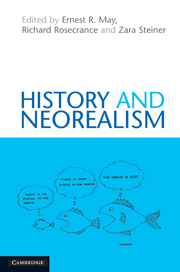Book contents
- Frontmatter
- Contents
- List of tables
- Notes on contributors
- Acknowledgments
- 1 Theory and international history
- 2 Transformations in power
- 3 Domestically driven deviations: internal regimes, leaders, and realism's power line
- 4 How international institutions affect outcomes
- 5 Not even for the seventeenth and eighteenth centuries: power and order in the early modern era
- 6 Austria-Hungary and the coming of the First World War
- 7 British decisions for peace and war 1938–1939: the rise and fall of realism
- 8 Realism and risk in 1938: German foreign policy and the Munich Crisis
- 9 Domestic politics, interservice impasse, and Japan's decisions for war
- 10 Military audacity: Mao Zedong, Liu Shaoqi, and China's adventure in Korea
- 11 The United States' underuse of military power
- 12 The overuse of American power
- 13 Redrawing the Soviet power line: Gorbachev and the end of the Cold War
- 14 Shared sovereignty in the European Union: Germany's economic governance
- 15 John Mearsheimer's “elementary geometry of power”: Euclidean moment or an intellectual blind alley?
- 16 History and neorealism reconsidered
- Index
- References
4 - How international institutions affect outcomes
Published online by Cambridge University Press: 05 June 2012
- Frontmatter
- Contents
- List of tables
- Notes on contributors
- Acknowledgments
- 1 Theory and international history
- 2 Transformations in power
- 3 Domestically driven deviations: internal regimes, leaders, and realism's power line
- 4 How international institutions affect outcomes
- 5 Not even for the seventeenth and eighteenth centuries: power and order in the early modern era
- 6 Austria-Hungary and the coming of the First World War
- 7 British decisions for peace and war 1938–1939: the rise and fall of realism
- 8 Realism and risk in 1938: German foreign policy and the Munich Crisis
- 9 Domestic politics, interservice impasse, and Japan's decisions for war
- 10 Military audacity: Mao Zedong, Liu Shaoqi, and China's adventure in Korea
- 11 The United States' underuse of military power
- 12 The overuse of American power
- 13 Redrawing the Soviet power line: Gorbachev and the end of the Cold War
- 14 Shared sovereignty in the European Union: Germany's economic governance
- 15 John Mearsheimer's “elementary geometry of power”: Euclidean moment or an intellectual blind alley?
- 16 History and neorealism reconsidered
- Index
- References
Summary
A generation ago, Imre Lakatos expounded a theory of scientific progress in the natural sciences. Whether he meant his theory to apply to social science or not, it has proved to be a fruitful point of reference for students of international relations seeking to evaluate their own research programs and compare them with rival programs. Yet the Scottsdale Conference, where papers for this volume were discussed, clearly showed that Lakatos's framework does not provide a clear, operational framework for the analysis of research programs. As David Dessler convincingly argued, the “hard core” of Lakatos's research program cannot be defined, and we do not know what counts as a “novel fact.” It is therefore relatively easy for research programs to avoid being labeled as degenerative. As Dessler also suggested, however, we can tell our stories in Lakatosian terms. Although Lakatos's criteria are ambiguous and his own formulations often contradictory, thinking about whether research programs are “progressive” remains, in our view, a useful way to help us evaluate their relative merits.
It is in this spirit that we engage in the current project. We are not scholars of the philosophy of science, and we are not particularly interested in arcane debates about what Lakatos “really meant” or what he “should have said.” However, we find that his criteria for progressiveness provide sensible, if not unambiguous, criteria for the evaluation of scientific traditions.
- Type
- Chapter
- Information
- History and Neorealism , pp. 49 - 77Publisher: Cambridge University PressPrint publication year: 2010
References
- 1
- Cited by



